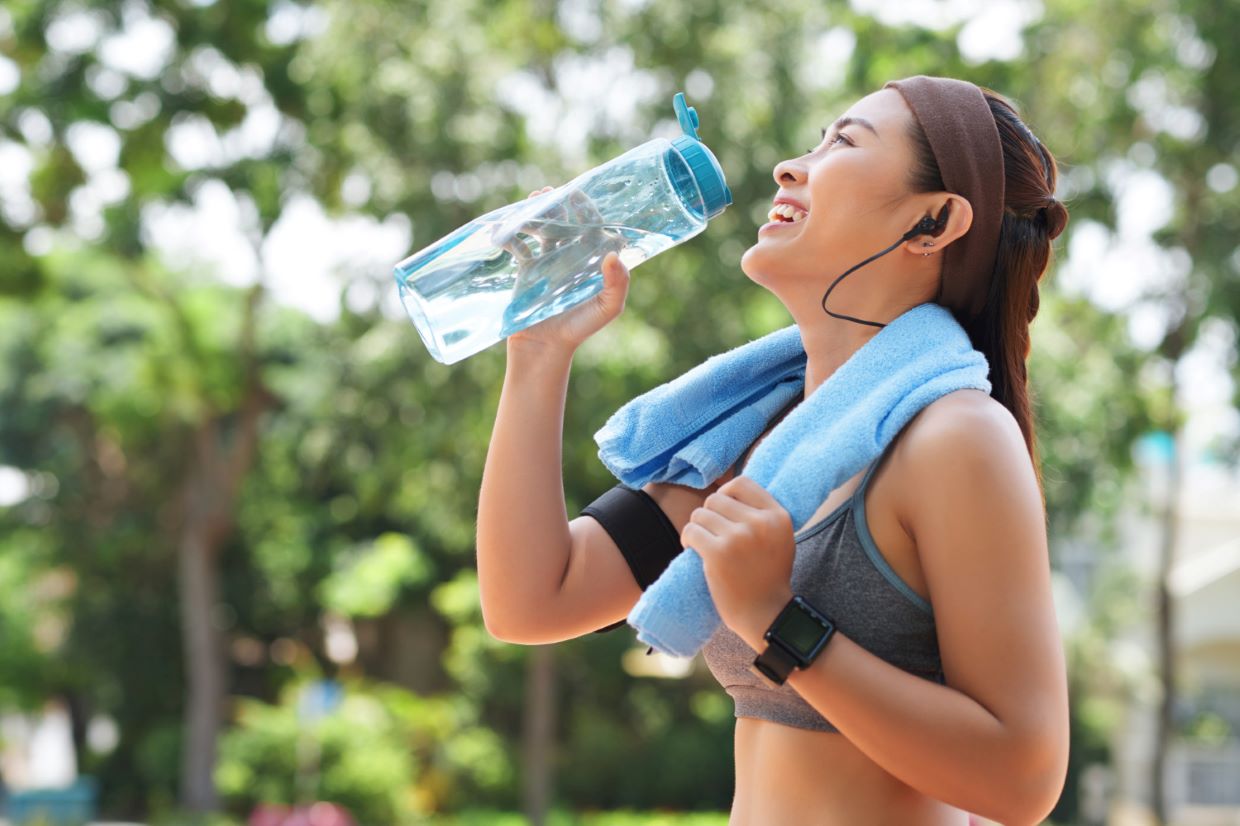As fluid loss worsens from one being mildly to moderately to severely dehydrated, it can lead to signs of mental and physical decline that will need immediate action for reversal. If symptoms of severe dehydration are concerning enough, they may also require the assistance of a medical professional.
1. Not Urinating or Very Dark Urine
An easy way to test and see if you’re dehydrated is checking the color of your urine. Normal urine should be pale yellow in color, like lemonade. If your urine is a darker color, similar to apple juice, this could be a sign of moderate to severe dehydration. Not urinating at all? You’re most likely severely dehydrated.
What to do: Should you find your urine is a dark yellow, be sure to start drinking more water immediately. It’s best to take small sips of water your body can properly absorb, rather than gulping down glass after glass of water that your kidneys will expel. If you feel you’re not getting enough fluids on a regular basis, consider taking a large water bottle with you to drink throughout the day—at work, in the car and on the go.
2. Dry Skin That Doesn’t Bounce Back When Pinched
Checking the color of your urine is not the only quick test you can perform to determine if you’re dehydrated. A person’s skin elasticity is also telling. Try this: Pinch the skin on the top of your hand and see what happens. If it moves back slowly, this is an indication that you’re mildly to moderately dehydrated. If the skin seems to stick together (i.e., it “tents”), this is a sign of severe dehydration.
Like with darker urine, you should increase your water intake and drink fluids if you’re experiencing mild to moderate dehydration. While a glass of water is a good “go-to,” if you’ve just finished a strenuous workout, you can also try like a sports drink or coconut water. If you are severely dehydrated and your skin tents, you may have to visit a healthcare provider who can help treat dehydration.
3. Rapid Heartbeat and Breathing
It’s natural to have an increased heart rate and rapid breathing while exercising. But if your symptoms don’t go away once you’ve cooled down—or you haven’t been working out and you experience these symptoms—it could be a sign of severe dehydration as depleted amounts of electrolytes can affect the heart’s ability to pump blood.
What to do: Fluid intake is crucial for organs like your heart, liver, kidneys, and lungs to function properly. So, it’s important you visit a doctor for dehydration when you experience these symptoms. After thorough examination, if a medical professional determines you are dehydrated, you’ll likely be hooked up to receive intravenous fluid containing a concentrate rehydration solution (water with salts and sugars like sodium chloride and potassium) for quick delivery of fluids to the thirstiest parts of your body.
4. Confusion, Dizziness or Lightheadedness
Did you know that your brain is composed of ? That’s why drinking water and eating water-filled foods can help your brain work better. On the flip side, if you don’t get enough fluids it can have adverse effects. If you’re feeling like you might pass out at any moment, or you’re confused over where you are, how you got there or what you’re doing, it might mean you are severely dehydrated.
What to do: Don’t take symptoms like these lightly. Properly rehydrate by slowing drinking water and eating like cucumbers, watermelon, tomatoes, strawberries, apples, and grapes. Both options will help replenish your body with the minerals and electrolytes it needs to absorb into the brain and tissues. If you’re experiencing severe dehydration with confusion, you should go to the emergency room to be checked out by a healthcare provider.
5. Fever and Chills
Usually we associate a fever and chills with having an illness like the flu or an . But don’t let this warning sign fool you. It’s also a dangerous sign of severe dehydration. When your body doesn’t have enough fluids, it’s hard to maintain a regular body temperature and this can lead to hyperthermia and fever-like symptoms including chills.
Stop any sport or strenuous activity you’re involved in immediately. The stress you’re placing on your body and its systems is making your symptoms worse. To treat dehydration at home, drink more fluids and either apply a cold compress to your face or take an ice bath to cool down. If your temperature doesn’t improve, or it reaches above 103° indicating severe dehydration in adults, go to the nearest emergency room.
6. Unconsciousness
If you or someone you know is feeling lightheaded or hot due to a high body temperature, they might be on the brink of passing out. Unconsciousness results from several factors, including low blood pressure, dizziness, etc. When accompanied with other dehydration signs, this could be indicative of severe fluid loss.
Unconsciousness is a red flag that your body is in dire need of water. Call 911 immediately if you’re around someone who passes out. They’ll need to be transported to the emergency room right away for dehydration treatment. Like with other serious signs of dehydration, you or the person affected will most likely receive rehydration therapy. You’ll be monitored by doctors to ensure you’re stable and your fluid levels have returned to normal before you’re released.



Leave a Reply